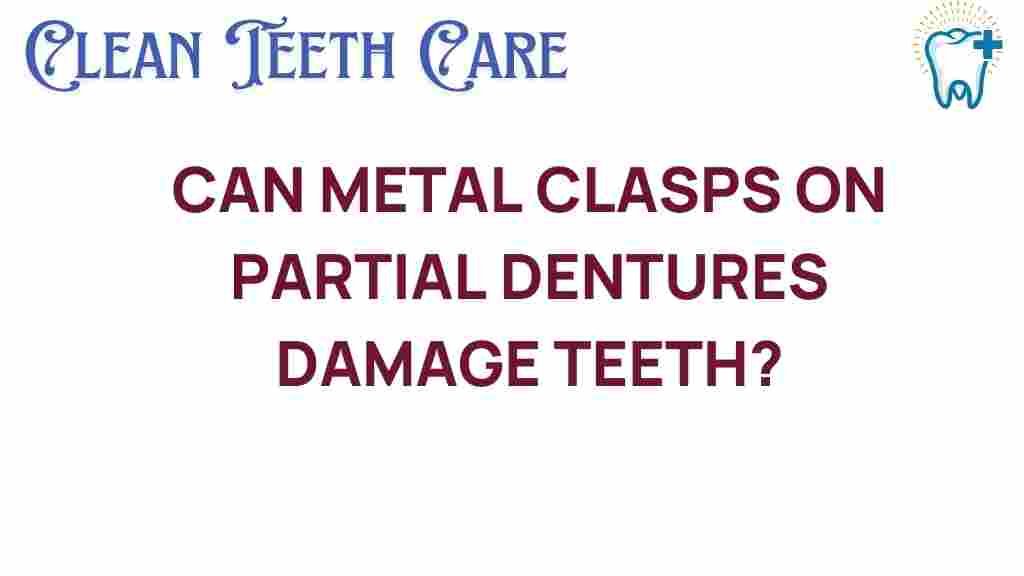Do Metal Clasps on Partial Dentures Pose a Hidden Threat to Your Teeth?
Partial dentures are a popular solution for individuals missing some teeth, providing not only aesthetic benefits but also restoring functionality to the mouth. A common component of many partial dentures is metal clasps. While they are designed to secure the prosthetic in place, there is growing concern about the potential risks they pose to your dental health. In this article, we will explore the implications of metal clasps on partial dentures, examining their impact on tooth damage, oral hygiene, prosthetics, and gum health.
Understanding Metal Clasps and Partial Dentures
Metal clasps are metallic components attached to partial dentures, allowing them to anchor to the remaining natural teeth. While they serve an essential purpose in stabilizing the denture, it’s crucial to consider how they interact with your dental health.
The Role of Metal Clasps in Partial Dentures
Metal clasps function as a retention mechanism for partial dentures. They grip onto adjacent teeth, helping to keep the denture securely in place during chewing and speaking. Here are some key functions of metal clasps:
- Stability: They provide necessary support to prevent movement of the denture.
- Retention: Metal clasps help maintain the position of the denture, improving comfort.
- Durability: Made from strong materials, they withstand the forces of biting and chewing.
Potential Risks of Metal Clasps on Dental Health
Despite their benefits, metal clasps can pose several risks to dental health:
- Tooth Damage: Metal clasps can cause wear on adjacent teeth over time. The pressure exerted by the clasps may lead to enamel erosion or even fractures, especially if the clasps are not properly fitted.
- Gum Health: Poorly designed or ill-fitting clasps may irritate the gums, leading to inflammation or gum disease.
- Oral Hygiene Challenges: Metal clasps can create difficult areas for cleaning, increasing the risk of plaque buildup and cavities.
Steps to Ensure Dental Health with Partial Dentures
Maintaining optimal dental health while using partial dentures with metal clasps involves several proactive steps:
1. Regular Dental Check-ups
Schedule regular visits with your dentist to monitor the condition of your partial dentures and adjacent teeth. This helps identify issues early and prevent serious complications.
2. Proper Fitting of Dentures
Ensure that your partial dentures are custom-fitted by a qualified dental professional. A well-fitted appliance minimizes the risk of tooth damage and gum irritation.
3. Good Oral Hygiene Practices
Maintaining excellent oral hygiene is crucial. Here are some tips:
- Brush your teeth at least twice a day with fluoride toothpaste.
- Use a soft-bristled toothbrush to avoid damaging the clasps and surrounding teeth.
- Floss daily, focusing on areas around the clasps where plaque can accumulate.
- Consider using an antimicrobial mouthwash to reduce bacteria in the mouth.
4. Rinse After Meals
Rinse your mouth with water after meals to help remove food particles stuck around the clasps and dentures.
Troubleshooting Common Issues with Metal Clasps
If you experience any problems with your partial dentures or metal clasps, here are some troubleshooting tips:
1. Discomfort or Pain
If you feel discomfort or pain, it may indicate that the clasps are too tight or that the denture is not fitting properly. Consult your dentist for adjustments.
2. Movement of the Denture
If your denture becomes loose, it may be a sign that the clasps are worn or that the denture itself needs to be relined. Seek professional help to ensure proper retention.
3. Gum Irritation
Gum irritation can occur if the clasps dig into the gums. Make sure to keep the area clean and consult your dentist for possible adjustments.
4. Difficulty Cleaning
If you find it challenging to clean around the clasps, consider using dental tools like interdental brushes or a water flosser to maintain oral hygiene.
Conclusion: Balancing Functionality and Dental Health
Metal clasps on partial dentures serve a vital role in providing stability and functionality for individuals with missing teeth. However, they can pose risks to dental health, including tooth damage, gum irritation, and challenges in maintaining oral hygiene. By following proper dental care practices and consulting with a dental professional regularly, you can enjoy the benefits of partial dentures while minimizing potential threats to your dental health.
Remember that your dental care is essential for maintaining not only your smile but your overall health. For more information on maintaining oral hygiene and dental care, check out this helpful resource.
Stay proactive about your dental health, and don’t hesitate to reach out to your dentist with any concerns regarding your partial dentures and metal clasps. By taking these steps, you can ensure that your prosthetics enhance your quality of life without compromising your dental health.
For further reading on the importance of gum health and how to protect it while using dental prosthetics, consider visiting this external link.
This article is in the category Conditions and created by CleanTeethCare Team
